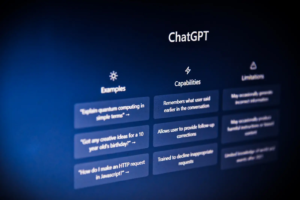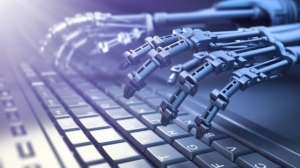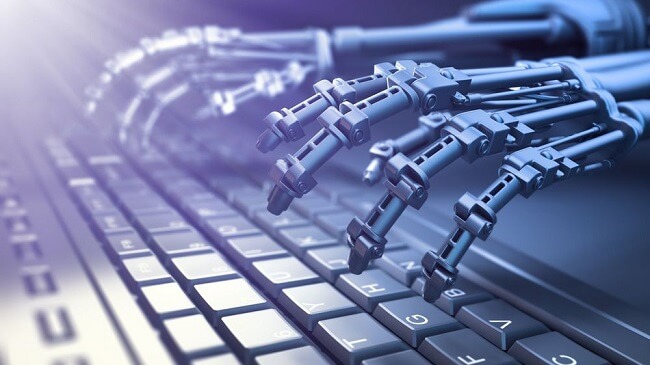Martha Brockenbrough on AI, the Future, and Toast
As the national conversation turns toward AI and the unrelenting, onward march of technology, AI writing tools like ChatGPT are at the forefront of the list of concerns writers have about publishing in the time of artificial intelligence. To offer insight and advice (and a pretty delicious toast recipe) we’ve looked to an author who has never shied away from writing about daunting topics, faculty member and award-winning author Martha Brockenbrough, who has been studying the advancements of AI for her book, Future Tense: How We Made Artificial Intelligence and How It Will Change Everything (coming in 2024.) See what Martha has to say about this intimidating topic below.
 Wild Things: There have been some incredible and nerve-wracking advancements in the realm of Artificial Intelligence as of late. You deal with this subject in your upcoming book Future Tense. Can you tell us a little about your new book and what you researched in writing it?
Wild Things: There have been some incredible and nerve-wracking advancements in the realm of Artificial Intelligence as of late. You deal with this subject in your upcoming book Future Tense. Can you tell us a little about your new book and what you researched in writing it?
Martha Brockenbrough: I spent nearly four years researching and writing Future Tense: How We Made Artificial Intelligence and How It Will Change Everything. It’s the longest I’ve ever spent on a nonfiction project, and that’s because there was so much to learn. I wanted to put it into a human context. It didn’t sprout like a fungus overnight. Humans have dreamed about it literally for millennia, and it took contributions from around the globe over centuries to bring us where we are today: at the dawn of a brand-new technology that will eventually be able to beat humans on pretty much all cognitive tasks—and it will replicate many of our existing biases. I research history, neuroscience, technology, political science and more, and had the book checked not only by AI developers, but also by AI experts who come from communities typically marginalized by the same technology. I wanted to understand its entirely human roots and the effects of AI on humanity. This is not a technology book entirely; it’s much more of a human story.
WT: What was the most interesting thing you learned during your research?
MB: As much as we think of human beings as rational creatures, we aren’t. For the most part, we are driven by our emotions in ways we often fail to see and understand. Learning about the role of emotions in decision-making was fascinating, as well as learning about the role of emotion in computing, which is not the oxymoron you think it is. This plays out in a couple of significant ways. First, human experts are always sure AI can’t do the thing they can do. But it has proven people wrong with chess. With go. With Jeopardy! And with things like driving commercial trucks. We think our creativity is special—but it’s not. Meanwhile, many of us are going to develop deep attachments to the AI-powered bots in our lives. We’re used to seeing androids on TV wishing to be human and having attachments to us. The attachment is going to run the other direction, and it leaves us vulnerable to … a lot.
WT: What aspects of AI advancement do you feel are positive for the world as a whole?
MB: When I was a college student in the early 1990s, I took part in a paid experiment at Hewlett Packard, where they were trying to develop technology to recognize speech. I think I disappointed the tech, who really wanted me to stop punching my Ps as I spoke into their microphone. Now, though, we can talk into our phones and get directions or create reminders and our Ps can be perfectly percussive. It took a long time to arrive, but speech recognition is now everywhere. I also like the idea of loans in three minutes. I like the idea of medicine tailored to my genome. I like the way the world can become more accessible through various AI-powered applications.
WT: Are there aspects of AI that you feel are concerning?
MB: Oh, for sure. People will be radicalized by bots. They will be catfished and robbed. Racial bias that exists in the world is baked into the heart of AI that grabs vast amounts of data from the unscrubbed internet. Likewise gender bias. I’m not wild about the idea of being tracked and recognized everywhere I go. In truth, I live a pretty boring life. I don’t even break the speed limit. But we keep flirting with authoritarian governments in the US, and I am an outspoken critic of such things (my book Unpresidented is a case in point). Intellectuals and artists are often targeted by authoritarian regimes, AI will make surveillance a snap. And because I like thinking up plots, if I were writing such a world, I’d send out autonomous drones to eliminate those people, which they can do—including from great distances.
WT: Is AI-created art a novelty, a phase, or is it here to stay? What are the implications of that?
MB: It’s all of the above. The implications for artists, though, are bad. We live in a world that values and respects the accumulation of money. The best way to do this is to get things without paying for them. This is why companies pay as little as they must (except for the CEO, of course). This is why we have outsourced much of manufacturing. When I was starting out as a freelance journalist after I had my first kid (and with 10 years of experience under my belt), I earned $2 a word in magazines. That’s about what people in the sixties made for the same work—but not adjusted for inflation. By the time I stopped doing it, it was common to get 50 cents a word. This is because the internet changed the market for advertising, which meant that print media got hammered. And then on the internet, no one wanted to pay for content.
So life has already gotten harder for us. And it’s going to get harder.
AI-created art is going to meet the needs of a lot of people who would prefer to keep more of their money, which is a rational choice in a world where capitalism is the one true religion. Like, people will say things like, “the point of business is to make money” and not even think that’s weird. The point of business is to fill a need. The point of many businesses together is to build a community. If the point was to make money, we would all only ever be in the businesses that paid the most. And honestly, hedge fund managers—who are grossly overpaid—are pretty much only useful in an extremely narrow sense.
My guess is that fewer people will be able to make a living creating art. More people will need day jobs. But we can continue to distinguish our work from machine-made work by making beautiful things that are lavished with artifacts of our full humanity. Handmade things are beautiful and durable. Fresh-squeezed juice from oranges grown by a skilled farmer tastes better than Tang. It’s true that AI has become better at games like chess, Go, and Jeopardy! But art isn’t a game. There aren’t strategies for winning or losing, and while algorithms can analyze text and calculate mathematical similarities to bestselling work (or pop songs or whatever), that’s not necessarily the same path to work that resonates with real humans. Commercial and genre writing does tend to follow more distinct patterns than what we would consider literary fiction—but even with those categories, innovation sustained across the length of a novel is a hard problem for AI, which tends to forget what it was doing and wander off in a different direction.
WT: What would you say to writers who are worried about being replaced by writing AIs like ChatGPT?
 MB: Right now, ChatGPT writes terrible endings. It’s the biggest tell. Everybody learns from each other and makes peace at the end. It’s a fever dream of the centrist mainstream media, but in story form. So there’s that. ChatGPT also can’t track narrative threads for the duration of a novel—yet. (It got much better during the time I conducted my research, from something laughably kooky to merely irritatingly unimaginative).
MB: Right now, ChatGPT writes terrible endings. It’s the biggest tell. Everybody learns from each other and makes peace at the end. It’s a fever dream of the centrist mainstream media, but in story form. So there’s that. ChatGPT also can’t track narrative threads for the duration of a novel—yet. (It got much better during the time I conducted my research, from something laughably kooky to merely irritatingly unimaginative).
I’d also say this, though. A lot of people have lost their jobs to technology. All the Wheelers. The Millers. The Smiths. It is already almost impossible to make a living as a writer. If it becomes impossible, then we join a long line of people who’ve had their lives disrupted and changed. People who’ve had to adapt. We need to feel compassion for ourselves and compassion for all who’ve been made obsolete by human invention. We think we’re special because we’re artists—but Garry Kasparov thought he was special because he was for a time the world’s best chess player. He thought there was no way a machine could be more creative. There are going to be a lot of stories like that, where we realize what we’re doing with thinking and creating is following complex patterns we’ve internalized and can reproduce in compelling ways. We are not special because we’re artists. We’re special because we are living creatures. Life is an absolute miracle. We’re not sure where it comes from (although I describe one compelling theory in my book). With AI, it’s possible that it will someday turn into a life form of its own, which changes the game all over again.
What do we need to worry about? The health of the planet. Justice for all human beings. Ethical treatment for all living things. Children and other vulnerable people. Making life impossible for the oligarchs, who need much less power and money than they’ve accumulated. Work for justice and the rest will take care of itself.
WT: We’re familiar with the phrase “adapt or die.” What are ways that authors can use AI to their benefit?
MB: There are tools that will analyze complete novels for pacing, narrative shape, character analysis and more. It’s like having another set of eyes on your work. It doesn’t tell you how to change it, but when you can see your work with fresh eyes, you can figure out those changes yourself. I use one called authors.ai. Here’s a referral code for the one I use: Meet Marlowe.
I’ve also engaged ChatGPT in discussions of my works in progress, and it’s pretty good at analyzing stories using the Hero’s Journey or Save the Cat. I usually write multiple POV novels, and these formulas tend not to work as well for those—and sure enough, ChatGPT can’t handle it. But you might talk with a bot about what you’re working on. Anything that can help you understand what you’re trying to do and analyze what you’ve done is useful. This doesn’t have to replace human beta readers, agents, and editors. But sometimes we just don’t want to burden people with crappy work. AI doesn’t care if you suck. AI doesn’t feel.
WT: What do you see on the technological horizon that we (writers, teachers, readers, people in general) should be prepared for?
MB: There are already lousy little AI picture books for sale on Amazon. Writers should expect to see more of that. One funny thing, though, is that blank notebooks can cost more than books we write—books that many people have spent many hours producing. Now, people are using AI art for covers on those, and selling blank books with robot art for more money than novels. The world is messed up with how it values things already. We should be prepared for people to like some really questionable stuff.
People who don’t have the patience to write will try to take AI shortcuts. There’s an AI tool that you can give a prompt and it writes the next part of your story for you. I thought it was absolutely terrible when I tried it, but I did read about an indie author writing books really fast this way and I guess making a living. Seems like a terrible way to make a life, though. I mean, sell the blank notebooks already! You’ll make more!
Teachers need to watch out for people using chatbots to write their papers. This is where smart assignments that don’t necessarily make sense to chatbots—What do the Parthenon friezes have in common with the Velveteen Rabbit—might be a good idea. (Chatbots are trained on huge quantities of text and “think” in terms of probability. The probability of a paper containing these two things is very low, and possibly even a sample size of 1—a paper I wrote in college 30 years ago.)

WT: Is there legislation currently or in the works (that you know of) that would set ethical limitations for AI? If not, what ethical limitations would you use if you were writing the laws?
MB: There are organizations and universities (such as Stanford) with programs that consider ethical limitations. This is a good thing, of course, even if the ethics came later than they should’ve (companies hiring grads didn’t care if they were ethical—they wanted them to have certain skills, so that won out in the early days).
It’s a really hard problem because the same technology can have great uses and it can have evil ones. It’s also hard to get the genie back in the bottle once tech has been developed. And companies like Google, which originally aimed to “don’t be evil” have shrugged off that quaint idealism.
I’d actually focus on easier problems, like a just tax code optimized for public health and safety. Which you could probably figure out using AI. Once we stop letting people amass billions while committing evil deeds, and once we stop letting churches avoid taxes while engaging in the political divisions of this nation, we will have disincentivized evil. And we will have new bridges and high-speed trains and well-funded schools and well-fed children and healthcare for all.
People are going to do whatever it is that nets them power and money. Work for a more just system there, and evil becomes less tempting.
And on a practical level, I think any company that harvests data from users should pay those users for it. If data is the new oil, pay us like people pay landowners, who must consent and be compensated for that product.
WT: Your work often deals with daunting subjects, which you face head-on. How do you maintain realistic, non-toxic positivity day to day in the face of these increasingly unpresidented (sorry, I had to) times?
MB: HA. Well, it’s not always easy. I worked so hard on Unpresidented that I literally became sick and had to spend almost a month in bed after I finished. (But we’d just gotten kittens, so there was a bright side!) I’ll tell you my secret to staying afloat. Every day, I think about the fact that I will die, and so will everyone I love. This is an inescapable truth, and it makes me unbearably sad. Being born in the first place is winning the hardest lottery in the universe. My job is to live the best life I can. To do the best I can for the world. To love my people. I can’t control much, but I can choose much of what I focus on and much of how I respond to things that happen. There’s plenty out there that’s frustrating, but I’m not going to give that more energy than I am to the stuff and souls I care about. I know my mission in this world: to love fiercely and tell the truth. And I’m doing that—so the joy and gratitude run deep.
WT: Let’s have a palate cleanser! Share a short recipe that always makes you happy.
MB: Toast is one of my favorite foods. I love it so much. If you want a really delicious slice and have a toaster oven, butter it first. It takes a long time to brown this way, but the butter caramelizes a bit. And then put on honey and some flaky sea salt. Cut it in half diagonally. Now you have a perfect slice of sweet-salty toast.
Learn more about Martha and her work at www.marthabrockenbrough.com


